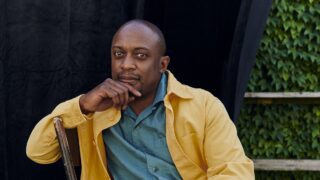The Lavin Agency Speakers Bureau
A speakers bureau that represents the best original thinkers,
writers, and doers for speaking engagements.
A speakers bureau that represents the best original thinkers,
writers, and doers for speaking engagements.
This is a time for protest and activism, but it is also a time for subtlety, ambiguity and complexity.
A prodigious novelist, critic, and photographer, Teju Cole was born in the US and raised in Nigeria—a biographical fact that informs much of his work. His latest book, Tremor, was named to TIME‘s 10 Best Nonfiction Books and 100 Must-Read Books of 2023. His second novel, Open City, won the PEN/Hemingway Award, while his first book, Every Day Is for the Thief, was named a Book of the Year by The New York Times. Hailed by Salman Rushdie as “among the most gifted writers of his generation,” Teju’s work serves as a reminder that “that darkness cannot last forever, and even within it, there is meaning and hope.”
“He is a writer for our times.”
— The Guardian
Teju Cole is currently the Gore Vidal Professor of the Practice of Creative Writing at Harvard. He is formerly the photography critic for The New York Times Magazine from 2015—2019 (a position he originated). In both writing and photography, Teju combines his eye for beauty with his capacity to perceive human and civic truth.
In his latest book Tremor, we follow Tunde, a West African teacher of photography on a renowned New England campus, as Teju engages with music, race, and history to explore the passage of time and how we mark it. In a starred review, Publishers Weekly described it as “remarkable and experimental. Everything hangs together brilliantly, due to Cole’s subtle provocations and his passion for art and music. It’s a splendid feast for the senses.” Tremor was named to TIMEs 10 Best Fiction Books and 100 Must-Read Books, Publishers Weekly Best Fiction, Financial Times Best Fiction, and Washington Post’s Notable Works of Fiction.
In Black Paper, Teju asks: What does it mean to sustain our humanity in times of darkness? One of the most celebrated essayists of his generation, he raises and explores, with razor precision, some of the most important ethical questions of our time: what does it mean to be human, to bear witness to the humanity of others, and to recognize how our individual present is informed by a collective past. “To read this book is to enjoy the generosity of his thought, to be invited into a contemplation of your inner life, to embrace the complexity of others, and to see in the darkness not only despair but also understanding and even refuge” (The Guardian).
Open City, awarded the New York City Book Award for Fiction, the Internationaler Literaturpreis, and the Windham Campbell Prize for Fiction; and was named one of the best books of the year by The Guardian, Newsweek, The Atlantic, The New York Times, and more. Teju has even been heralded as “among the most gifted writers of his generation,” by Salman Rushdie. His second title, Known and Strange Things, collects a series of essays that span art, literature, and politics, with topics ranging from the White Savior Industrial Complex, and Black Lives Matter, to Snapchat and Shakespeare. It was named one of TIME’s Top 10 Nonfiction Books, as well as one of Harper’s Bazaar’s 13 Best Books, and made Kirkus Reviews’ Best Nonfiction list. His novella, Every Day Is for the Thief, has been “widely praised as one of the best fictional depictions of Africa in recent memory” (The New Yorker) and was named one of the best books of the year by The New York Times, The Telegraph, The Globe and Mail, and NPR.
Teju’s incredible solo exhibit in Milan, Punto d’ombra, was published as a gorgeous collection of photographs in the book Blind Spot: each full-color photo accompanied by selections of lyrical prose that explore “the mysteries of the ordinary” (The New York Times Book Review). Blind Spot was named one of TIME’s Top 10 Nonfiction Books of 2017.
Recently, Teju was invited by the Museum of Contemporary Art in Chicago to curate an exhibit, titled “Go Down Moses”, after the well-known spiritual song. The exhibit explores themes of freedom, suffering, the environment, and the future—and marks Teju’s major curatorial debut.
We had a great time with Teju. He was brilliant, insightful, courteous, and really easy to deal with.
University of British Columbia
Founder of the "I Matter" Poetry and Art Competition Teen Vogue 21 Under 21 Honoree Winner of the Princeton Prize in Race Relations

Former Mayor of Baltimore Founder, SRB & Associates

World-Renowned Artist Winner of the US Department of State Medal of Arts Guggenheim Fellow

Founder of the "I Matter" Poetry and Art Competition Teen Vogue 21 Under 21 Honoree Winner of the Princeton Prize in Race Relations

Award-Winning Artist Advocate for the Legacy of Nina Simone

World-Renowned Artist Winner of the US Department of State Medal of Arts Guggenheim Fellow

Author of Grit, the #1 New York Times Bestseller | Pioneering Researcher on Grit, Perseverance, and the Science of Success

2024 Nobel Prize Winner | 3rd Most Cited Economist in the World | Bestselling Co-Author of Why Nations Fail and Power and Progress

Harvard Business School Behavioral Science Professor | "40 Under 40 MBA Professor" | Author of TALK: The Science of Conversation and the Art of Being Ourselves

#1 New York Times Bestselling Co-Author of Abundance | Host of thePlain English Podcast | Founder of the Substack Derek Thompson

#1 New York Times Bestselling Author of How the Word Is Passed and Above Ground | The Atlantic Staff Writer

A prodigious novelist, critic, and photographer, Teju Cole was born in the US and raised in Nigeria—a biographical fact that informs much of his work. His second novel, Open City, won the PEN/Hemingway Award, while his first book, Every Day Is for the Thief, was named a Book of the Year by The New York Times. His latest book, Tremor, is “a master class in the morality of art. A provocative and profound meditation on art and life in a world of terror” (Kirkus starred review). Hailed by Salman Rushdie as “among the most gifted writers of his generation,” Teju reminds us “to embrace the complexity of others, and to see in the darkness not only despair but also understanding and even refuge” (The Guardian).